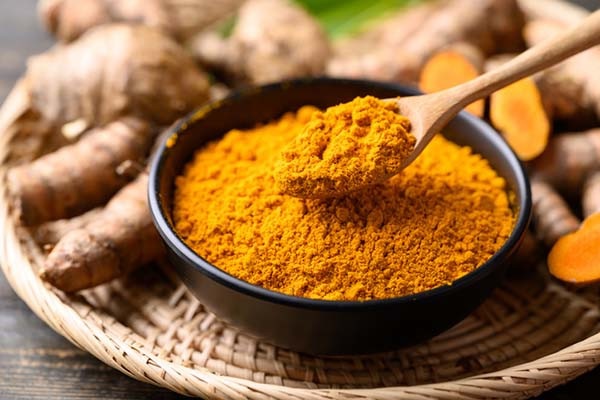
Many high-quality studies show that turmeric has major benefits for your body and brain. Many of these benefits come from its main active ingredient, curcumin.
Turmeric is a deep, golden-orange spice known for adding color, flavor, and nutrition to foods. A relative of ginger, turmeric comes from the rhizome (root) of a native Asian plant and has been used in cooking for hundreds of years. It has also been used in ayurvedic and other forms of traditional medicine in China and India.
What is turmeric good for?
The active ingredient in turmeric is a natural compound (polyphenol) called curcumin, which has both antioxidant and anti-inflammatory properties.
Curcumin has many biological activities, not all of which are understood. Like other colorful plant-based foods, turmeric is rich in phytonutrients that may protect the body by neutralizing free radicals (pollution, sunlight) and shielding the cells from damage. Diets rich in plant-based foods are associated with prevention of medical conditions such as cancer and heart disease.
The spice known as turmeric could be one of the most effective nutritional supplements in existence.
Anyone who’s trying to manage inflammation could benefit from adding some turmeric to their foods. Turmeric may help inflammatory conditions such as arthritis and other joint disorders, colitis, allergies and infections.
Science Behind Turmeric
Turmeric and its components, including curcumin, have been the subject of scientific studies.
Some research results show that people who have osteoarthritis reported less joint pain when eating turmeric in recipes. Turmeric’s effect on mood disorders, depression, dementia and Alzheimer’s disease have also been explored, but studies are small, so more research will reveal if there is a benefit.
In addition to these conditions, research studies have shown some possible benefits of turmeric for:
Inflammation
Degenerative eye conditions
Metabolic syndrome
Curcumin can boost brain-derived neurotrophic factor
Curcumin may also lower your risk of heart disease
Arthritis
Hyperlipidemia (cholesterol in the blood)
Anxiety
Muscle soreness after exercise
Kidney health
Turmeric may also help prevent cancer and delay aging / fight age related diseases
Turmeric Supplements
Turmeric supplements are probably not a good idea. As wonderful as turmeric’s nutritional benefits can be, more curcumin is not necessarily better, and too much can be risky.
For instance, turmeric supplements may increase your risk of kidney stones, especially if this runs in your family. Curcumin supplements contain much higher concentrations of the compound than a person would consume by eating food flavored with the spice or by drinking turmeric tea.
One challenge of turmeric is that curcumin and other active ingredients are not bioavailable, meaning they are not easily absorbed by the body. Also, the digestive process breaks these beneficial compounds down and eliminates them quickly.
With that in mind, incorporating the spice regularly into your meals can safely boost your intake. Combining the spice with black pepper may help increase your body’s ability to absorb turmeric’s beneficial compounds. A substance in black pepper called piperine, when combined with curcumin, has been shown to hugely increase bioavailability.
It’s better to get curcumin and most other nutrients in whole food form rather than to take turmeric pills, tinctures, capsules or gummies.
Turmeric Side Effects
While turmeric is safe for most people when enjoyed in tea or food, if you are allergic to the spice, eating it may cause a rash, hives or abdominal pain.
Most of the side effects are associated with very high concentrations of curcumin found in supplements (pills, capsules and gummies).
How to Enjoy Turmeric
Turmeric is used as a natural coloring agent for some kinds of mustard, and it is an ingredient in curry powder. Brown says she enjoys the earthy flavor of turmeric on its own, and notes that it adds a depth of flavor and a pleasing color to Thai or other Asian dishes, as well as stews and chilis.
Whole food retailers sell turmeric root which can be frozen to keep them fresh for up to six months.
Turmeric Tea with Ginger and honey
Turmeric can be made into a nourishing and tasty tea.
Mix the following ingredients into a teacup of boiling water:
1 teaspoon turmeric powder
1 teaspoon of powdered ginger (reduce quantity based on personal taste)
1 tablespoon of honey
You can drink turmeric tea warm or cold and add some lemon juice to change the taste.
